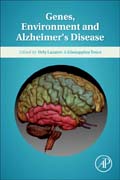
Genes, Environment and Alzheimer's Disease discusses the role that activities such as exercise can play in cardiovascular health, while also highlighting the fact that the last 10 years have brought great discoveries in the strong environmental component of brain disorders, neurodegeneration, and cognitive decline. It is now clear that brain insult is an environmental risk factor for AD, while on the other hand, lifestyle components such as exercise and level of education may play a protective role, delaying the onset and/or severity of the disease. Evidence from experiments in rodent models of Alzheimer's disease contributes major insight into the molecular mechanisms by which the environment plays its role in AD. Additionally, there are diseases related to lifestyle that may lead to AD. This volume reviews new discoveries related to all these factors, serving as a translational tool for clinicians and researchers interested in genetic and environmental risk factors for the disease. Provides the first volume to link genetic and environmental risk factors for Alzheimer's disease and dementiaAids researchers and clinicians in understanding the basic mechanisms of Alzheimer's disease and cognitive declineBrings the basic science and clinical perspectives together in a single volume, facilitating translational possibilitiesIncludes a range of molecular to behavioral components assembled into a single volume that creates an excellent resource for basic and clinical neuroscientists INDICE: 1. What Is Cognition? Molecular Mechanisms of Learning and Memory Daniela Puzzo, Jole Fiorito, Rosita Purgatorio, Walter Gulisano, Agostino Palmeri, Ottavio Arancio and Russell Nicholls 2. When Cognitive Decline Becomes Pathology: From Normal Aging to Alzheimer's Disease Eliezer Masliah and David P. Salmon 3. Adult Neurogenesis and Cognitive Function Keri Martinowich and Robert J. Schloesser SECTION I. Genetic Forms of AD 4. APP and Cognition Robert Marr 5. FAD Signaling, PS and Cognition Li Gan SECTION II. Environmental Factors 6. The effect of APOE genotype on amyloid-independent mechanisms Guojun Bu 7. Lifestyle and AD Orly Lazarov 8. Bace and Cognition Giuseppina Tesco 9. Traumatic Brain Injury and Rationale for a Neuropsychological Diagnosis of Diffuse Axonal Injury Douglas H. Smith 10. Alzheimer's Disease and the Sleep-Wake Cycle Adam W. Bero and Li-Huei Tsai 11. Stroke, Cognitive Function and Alzheimer's Disease Katherine A. Jackman 12. Cerebral innate immunity: a new conceptual framework for Alzheimer's David Gate and Terrence Town 13. Type 2 Diabetes and AD Marcelo Bonini
- ISBN: 978-0-12-802851-3
- Editorial: Academic Press
- Encuadernacion: Cartoné
- Páginas: 350
- Fecha Publicación: 01/03/2016
- Nº Volúmenes: 1
- Idioma: Inglés
